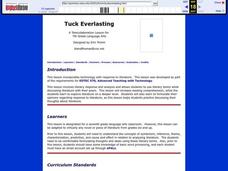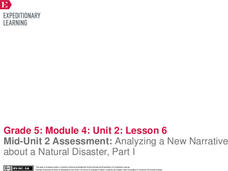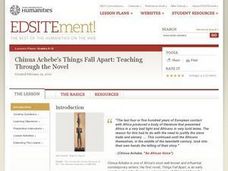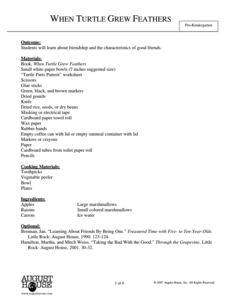Curated OER
Tuck Everlasting
Seventh graders use literary terms while discussing literature with their peers. They explore literature on a deeper level. Students formulate their opinions regarding response to literature, as this lesson plan helps students practice...
Curated OER
The Diary of Anne Frank
Eighth graders read the Diary of Anne Frank. In this novel reading lesson, 8th graders read and analyze the story. Students do online activities and create a newspaper giving a summary of three major events in the story. Students answer...
EngageNY
Mid-Unit 2 Assessment: Analyzing a New Narrative about a Natural Disaster, Part I
Scholars complete a mid-unit assessment by analyzing a narrative text, In the Middle of the Storm. Learners determine the gist of the text, identify synonyms, make inferences, and answer text-dependent questions to demonstrate...
Curated OER
Phineas Gage: Questioning Strategy
Focus on chapter two of Phineas Gage: A Gruesome but True Story About Brain Science with a questioning activity. After teaching and modeling several types of questions, learners work with partners and then independently to answer and...
Curated OER
Traveling With Limited Funds; A Tree Grows in Brooklyn
Young scholars participate in a pre-reading activity which helps them see what it would be like to live in poverty. In this reading comprehension lesson, students make a list of items they take on a trip considering they have very...
Education World
The African American Population in US History
How has the African American population changed over the years? Learners use charts, statistical data, and maps to see how populations in African American communities have changed since the 1860s. Activity modifications are included to...
Curated OER
Night of the Twister
Young scholars use reading strategies for Night of the Twister. In this reading strategies instructional activity, students name five major catastrophes and books about each. Young scholars complete a vocabulary section, make inferences...
Curated OER
Archeology: Weapons of the Texanos
Students develop archaeological context skills through a simulation which places them in the year 2500. After listening to the teacher read, "Weapons of the Texanos," they record what they think the weapon is. Next, in groups, they...
Curated OER
The Fear Place
Students use the strategy turn and talk to discuss inferences they have while reading the book The Fear Place. In this inferences lesson plan, students answer discussion questions and read independently as well.
Curated OER
Teaching Imagery with Gary Paulsen
Students read excerpts from memoirs written by Gary Paulsen as examples of how to write a narrative piece. They identify figurative language used and then they write a memoir of their own that contains imagery and figurative language.
Curated OER
Chinua Achebe's Things Fall Apart: Teaching Through the Novel
Students are introduced to Chinua Achebe's first novel and to his views on the role of the writer in his or her society. It can be used alone or in conjunction with the related lesson Chinua Achebe's Things Fall Apart.
EngageNY
Analyzing Point of View: Inferring about the Natural Disaster in Eight Days
Who is telling the story? Readers take a look at the text Eight Days to determine if the story is told in first or third person. They then discuss in groups and complete a shared writing activity to describe how the narrator's point of...
EngageNY
Analyzing Point of View: Inferring about the Impact of Hurricane Katrina on People Living in New Orlean
What, where, how? Readers hone their analysis skills as they determine the narrator's point of view in Eight Days. They complete a literary analysis chart and essay to describe what and where events take place. Individuals then discuss...
August House
When Turtle Grew Feathers
Friendship is a valuable part of growing up. Learn about the importance of friendship with a variety of activities based on When Turtle Grew Feathers by Tim Tingle. Kids practice making musical instruments, discussing plot points,...
Curated OER
Reading Between the Lines: Making Inferences About Idioms
Students discover idioms. For this inferencing lesson, students identify idioms from passages and infer meanings of unknown idioms using prior knowledge and experience. Students write sentences using newly learned idioms.
Curated OER
Colors, Characters, & Clues
Students investigate inferences. They define inference, view a Powerpoint presentation, answer questions about a picture book, and identify clues throughout the story as examples of inferences.
Curated OER
Asha's Village
Students compare and contrast their own culture with an Indian girl named Asha. For this culture lesson plan, students read, look at pictures, and make inferences.
Curated OER
Using Authentic Literary Text With Advanced Learners
Students practice reading for the gist of a text, improving reading speed, and fostering interest in reading authentic texts. They explore the use of figurative language.
Albert Shanker Institute
Economic Causes of the March on Washington
Money can't buy happiness, but it can put food on the table and pay the bills. The first of a five-lesson plan unit teaches pupils about the unemployment rate in 1963 and its relationship with the March on Washington. They learn how to...
Curated OER
Learning From Leaves: From Observation to Inference
Learners examine the adaptation of plants to their environments. They analyze and observe the structure, shape, and internal structure of various leaves, and make inferences about the structures.
EngageNY
Launching the Module: Quotes about the Middle Ages
Pick a corner. Scholars receive a quote about the Middle Ages and then participate in a four corners activity by choosing a corner pertaining to their quotes. They then work in groups of three to discuss the bold words in their quotes....
EngageNY
Contrasting Perspectives: Should the Farmworkers in Esperanza Rising Go On Strike? (Chapter 12: "Los Esparragos/Asparagus")
Explore multiple perspectives through a jigsaw activity that will improve your pupils' understanding of the characters in Esperanza Rising as well as their understanding of strikes and human rights. Tapping into prior knowledge, and...
Science 4 Inquiry
Layers and Laws: The Law of Superposition and Index Fossils
What can layers of rock teach us about the climate? Young scientists solve a mystery about who stole a cookie by applying the law of superposition. Then, they apply the same concept to solve a more difficult mystery, trying to determine...
EngageNY
Listening Closely and Taking Notes: Colonial Trade Podcast About the Wheelwright
Voices from the past. Young scholars listen to a podcast interview with a historical re-enactor as they continue their research in the eleventh instructional activity of this unit on colonial trade. Applying their close reading skills,...























